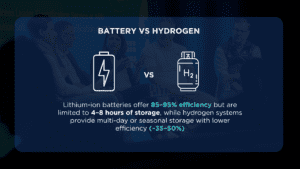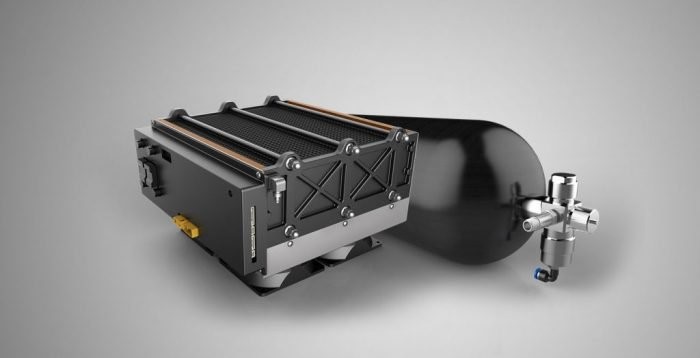As the world accelerates its transition toward net-zero, the question isn’t if we’ll move away from fossil fuels – it’s how fast and with what technologies.
Both battery and hydrogen energy storage systems are emerging as essential players in the clean energy landscape. They share one goal – balancing the intermittency of renewables – but differ in approach, scalability, and long-term potential.
According to the IEA’s Renewables 2024 report, renewable energy is expected to supply 42% of global electricity by 2030, driving exponential demand for long-duration energy storage technologies to stabilize grids and decarbonize hard-to-abate sectors.
👉 Learn more about how the energy transition is evolving at the Energy Tech Summit 2026.
Battery Energy Storage Systems: Efficiency Meets Flexibility
Lithium-ion batteries currently dominate the storage landscape – thanks to decades of R&D, economies of scale, and rapid cost declines. Between 2015 and 2023, battery pack prices fell nearly 90%, according to BloombergNEF.
Modern battery energy storage systems (BESS) boast round-trip efficiencies of 85–95%, enabling rapid response and short-duration balancing for solar and wind. The IEA projects global battery storage capacity to reach 1,200 GW by 2030, a 12-fold increase from today’s level.
However, batteries face challenges in energy density and duration. While ideal for fast grid balancing and EVs, they struggle with seasonal storage – a gap hydrogen may fill.

Lithium-ion batteries offer 85–95% efficiency but are limited to 4–8 hours of storage, while hydrogen systems provide multi-day or seasonal storage with lower efficiency (~35–50%).
Hydrogen Energy Storage
Hydrogen stands out as the energy-dense, long-duration counterpart to batteries. It stores energy as a fuel – ideal for heavy industry, transport, and balancing seasonal fluctuations in renewables.
According to the International Renewable Energy Agency (IRENA), clean hydrogen production could reach 38 Mt annually by 2030, up from just 1 Mt today. The technology can provide weeks or even months of energy storage, far beyond what batteries can currently achieve.
However, efficiency remains a challenge: electrolysis converts electricity to hydrogen at ~70–80%, and fuel cells return only ~50–60%, yielding an overall round-trip efficiency of 35–45%. Despite this, falling electrolyzer costs and expanding green hydrogen infrastructure are closing the gap.
The IEA estimates global electrolyzer manufacturing capacity will surpass 50 GW per year by 2030, signaling a strong industrial push.
Energy Density: Hydrogen vs Battery
When it comes to energy density hydrogen vs battery, hydrogen wins by an order of magnitude. Per kilogram, hydrogen stores around 120–142 MJ/kg, compared to just 0.5–1 MJ/kg for lithium-ion batteries.
This makes hydrogen ideal for heavy-duty transport, aviation, and shipping – sectors where battery weight remains a critical barrier. Batteries, however, dominate in light mobility and short-haul logistics, where compact systems and charging infrastructure are rapidly improving.
Long-Duration Energy Storage: A Shared Mission
The clean energy transition requires both technologies. As renewable penetration grows, hybrid systems – batteries for fast response, hydrogen for seasonal balancing – are emerging as the most resilient approach.
IEA’s Renewables 2024 forecasts global electricity storage demand to quadruple by 2030, with both lithium-ion and hydrogen-based systems expanding rapidly across Europe, Asia, and North America.
What’s Next?
The 7th edition of Energy Tech Summit 2026 – April 15–16 in Bilbao – will bring together over 1,500 leaders from energy, finance, and technology to explore this balance.
Expect discussions on hydrogen energy storage, battery manufacturing scale-up, and the infrastructure needed to integrate them into modern grids. Whether you’re an innovator, investor, or policymaker, this is where the roadmap for the future of energy storage takes shape.
🎟️ Buy your ticket to join the global conversation.
FAQ: Battery vs Hydrogen in the Future of Energy Storage
- Which is more efficient – battery or hydrogen energy storage?
Batteries achieve 85–95% round-trip efficiency, while hydrogen systems are 35–45% efficient. However, hydrogen offers unmatched long-duration and seasonal storage capabilities. - Is hydrogen energy storage scalable?
Yes. The IEA projects global electrolyzer capacity to exceed 50 GW annually by 2030, with major growth in Europe and Asia. - What role do batteries play in the future energy system?
Batteries are critical for short-term flexibility – stabilizing grids, supporting EVs, and integrating renewables into daily operations. - Where can I learn more about storage innovations?
Join the Energy Tech Summit 2026 or explore cutting-edge startup pitches at Energy Tech Challengers.


